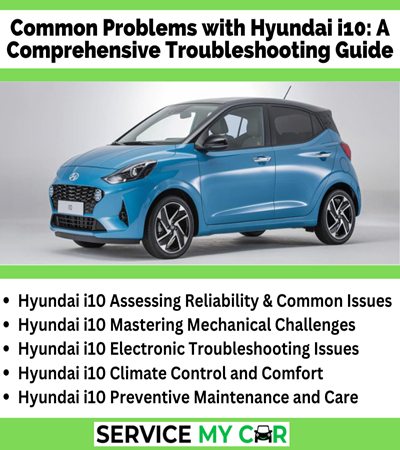
The Hyundai i10 has become a staple in the world of compact city cars, thanks to its affordability, maneuverability, and modern features. However, even this popular vehicle encounters occasional issues. This guide is designed to help you understand and tackle the most common problems faced by Hyundai i10 owners, ensuring a smoother driving experience.
Chapter 1: The Hyundai i10 – A Compact City Car
The Ideal Urban Vehicle
The Hyundai i10 exemplifies Hyundai’s commitment to providing reliable, fuel-efficient, and stylish transportation for city dwellers. Its compact size and agile handling make it perfect for navigating busy urban environments.
Evolution Over the Years
Since its debut, the Hyundai i10 has evolved significantly. Each new generation has improved on its predecessor, enhancing design, technology, and performance to meet the changing needs of its drivers.
Key Features and Design Philosophy
The i10’s design focuses on maximizing interior space while maintaining a small footprint. Its cabin is surprisingly roomy, providing comfort for both front and rear passengers. Advanced infotainment and safety features make the i10 a well-rounded choice for city driving.
Chapter 2: Assessing Reliability and Common Issues
Reliability Overview
The Hyundai i10 is generally reliable, but like any car, it has some common issues. Reviews and owner feedback highlight a few areas that require attention.
Common Problems
Owners have reported various issues, from transmission troubles and clutch problems to brake and suspension concerns. This guide covers these problems comprehensively, providing solutions to keep your i10 in top shape.
Warranty and Customer Support
Hyundai offers robust warranty coverage and dedicated customer service, helping owners address issues confidently and ensuring a stress-free ownership experience.
Chapter 3: Mastering Mechanical Challenges

Engine Performance
Common engine problems include stalling, rough idling, and power loss. This section provides diagnostic tips and repair strategies to keep your engine running smoothly.
Transmission Issues
Whether you have an automatic or manual transmission, this section covers common problems like gear shifting difficulties, fluid leaks, and clutch issues, offering solutions to prolong your transmission’s life.
Suspension and Steering
Suspension and steering are crucial for handling and comfort. Learn about common issues and practical solutions to maintain your vehicle’s dynamic performance.
Chapter 4: Electrical and Electronic Troubleshooting
Battery and Charging System
Electrical problems can range from battery drain to charging system failures. This section offers diagnostic techniques to keep your electrical systems in good condition.
Infotainment and Connectivity
Modern cars rely heavily on infotainment systems. This section addresses common issues like Bluetooth pairing problems and navigation glitches, providing steps to restore functionality.
Lighting and Electrical Accessories
From headlights to power windows, electrical accessories can fail. Find practical solutions to keep all your vehicle’s electrical components working properly.
Chapter 5: Climate Control and Comfort
HVAC System
Maintaining a comfortable cabin temperature is essential. This section covers issues with heating and cooling, including refrigerant leaks and compressor failures, offering guidance to keep your climate control system in peak condition.
Comfort and Convenience Features
Features like power-adjustable seats and sunroofs can enhance your driving experience. This section addresses common issues with these amenities and provides strategies for resolving them, ensuring a luxurious and comfortable ride.
Chapter 6: Preventive Maintenance and Care
Routine Maintenance
Preventive maintenance is key to vehicle longevity and reliability. This section emphasizes the importance of following manufacturer-recommended maintenance schedules and conducting regular inspections to identify potential issues early.
DIY vs. Professional Service
Some maintenance tasks can be handled at home, while others require professional expertise. This section helps you decide when to tackle repairs yourself and when to seek professional assistance, ensuring every job is done correctly.
Genuine Parts and Accessories
Using genuine parts and accessories is crucial for maintaining the Hyundai i10’s performance and integrity. This section highlights the importance of sourcing authentic components to ensure quality and compatibility.
Chapter 7: Future Trends and Innovations

Advanced Automotive Technologies
The automotive industry is rapidly evolving, and the Hyundai i10 is keeping pace. This section explores emerging trends like electrification, autonomous driving, and enhanced connectivity features, offering a glimpse into the future of this compact car.
Sustainability and Environmental Responsibility
As environmental concerns grow, Hyundai is committed to sustainability and eco-friendly technologies. This section discusses Hyundai’s efforts to integrate greener solutions, making the i10 a responsible choice for environmentally conscious drivers.
In case, you own a car and left wondering, how to find the nearest car garage to get the oil change tinting service? Open google type oil change dubai near me and you will find Service My Car on the top to get the car oil change service in the town.
Conclusion
The Hyundai i10 is a versatile and reliable companion for city dwellers seeking affordability, practicality, and modern features. While no vehicle is free from occasional issues, this comprehensive guide equips you with the knowledge and solutions to confidently navigate and overcome common challenges, ensuring a seamless and enjoyable driving experience.




